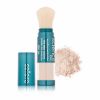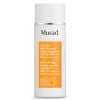Skin Care
11 Next-Level Mineral Sunscreens for Flawless Sun ProtectionThese physical sunscreens don't just protect -- they actually make your skin look better |
Gone are the days when mineral sunscreens were thick, chalky, and left your face covered in a (very unappealing) white residue. The latest formulations are sheer, weightless and barely detectable, not to mention ideal for layering under makeup.
But before we get to some of our faves, a quick science lesson. Sunscreens fall into one of two camps: those that use chemical blockers (common ones include avobenzone, oxybenzone and homosalate) and those that use physical blockers (minerals like zinc oxide and titanium dioxide) -- and some formulas combine the two. The difference? "Simply put, the chemicals penetrate into the skin and absorb UV rays, while minerals sit on top of the skin and deflect them," explains Peter Lio, MD, clinical assistant professor of dermatology at Northwestern University.
Which one you choose ultimately boils down to a matter of personal preference, though mineral sunscreens do have advantages. Mineral formulas are better tolerated if you have sensitive skin, says Lio, since chemical sunscreens are more likely to cause irritation, and they deliver immediate protection. (There's still some debate over how quickly chemical formulas take effect.) Some studies have also shown that physical blockers may not only deflect UVA and UVB rays, but skin-damaging infrared radiation, too (also known as IR, which we feel as heat). And while you can't necessarily equate mineral with natural -- mineral formulas do contain other ingredients, after all -- if you're looking to green your beauty routine, mineral is the way to go. TBH, the most important thing is that you're wearing sunscreen every single day, so find one that you love and stick with it. But if you're going to make it mineral, be sure to try any -- or all -- of these 11 standouts.
Image via Getty
SEE NEXT PAGE: Alastin HydraTint Pro Mineral Broad Spectrum SPF 36, $55
But before we get to some of our faves, a quick science lesson. Sunscreens fall into one of two camps: those that use chemical blockers (common ones include avobenzone, oxybenzone and homosalate) and those that use physical blockers (minerals like zinc oxide and titanium dioxide) -- and some formulas combine the two. The difference? "Simply put, the chemicals penetrate into the skin and absorb UV rays, while minerals sit on top of the skin and deflect them," explains Peter Lio, MD, clinical assistant professor of dermatology at Northwestern University.
Which one you choose ultimately boils down to a matter of personal preference, though mineral sunscreens do have advantages. Mineral formulas are better tolerated if you have sensitive skin, says Lio, since chemical sunscreens are more likely to cause irritation, and they deliver immediate protection. (There's still some debate over how quickly chemical formulas take effect.) Some studies have also shown that physical blockers may not only deflect UVA and UVB rays, but skin-damaging infrared radiation, too (also known as IR, which we feel as heat). And while you can't necessarily equate mineral with natural -- mineral formulas do contain other ingredients, after all -- if you're looking to green your beauty routine, mineral is the way to go. TBH, the most important thing is that you're wearing sunscreen every single day, so find one that you love and stick with it. But if you're going to make it mineral, be sure to try any -- or all -- of these 11 standouts.
Image via Getty
SEE NEXT PAGE: Alastin HydraTint Pro Mineral Broad Spectrum SPF 36, $55






































